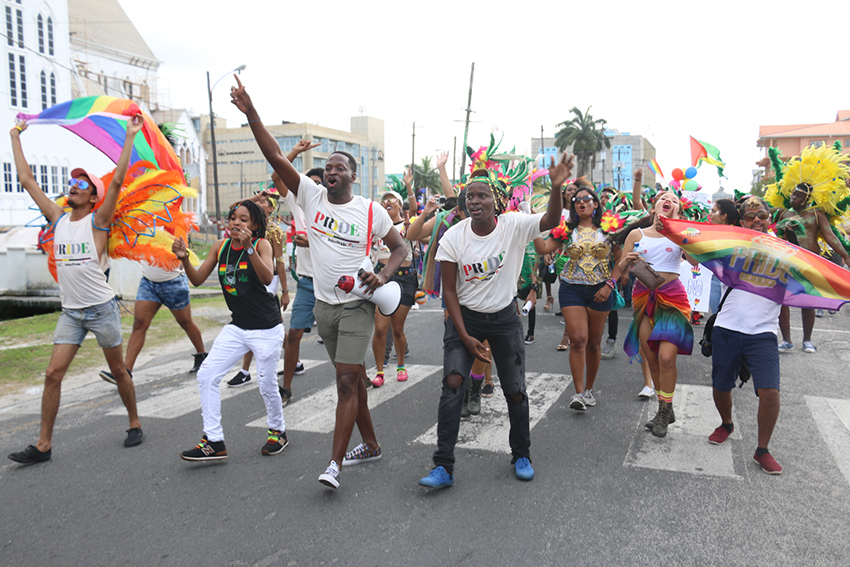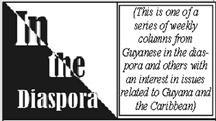Nicholas Peters is a writer, volunteer member of SASOD and human rights activist. He was the winner of the University of Guyana’s Walter Rodney Award for Creative Writing in the short fiction category. He has read his work in Guyana and Trinidad at the 2017 Bocas Literary Festival.
On the first Saturday of June 2018, along Church Street and in front of St. George’s Cathedral, history was made in Guyana with its first Pride Parade. Like most historic events, the day began with that dull breath of the weekend routine for most Guyanese. But to the approximately 300 revellers, the day would end in a rainbow of joyous camaraderie that would inevitably change the way the rest of the country looked at persons of the Lesbian, Gay, Bisexual, Transgender, Queer and Intersex (LGBTQI) community. To each participant of the parade, every step taken that day was a step closer towards equality, justice, acceptance and love for a community of people vulnerable to abuse, mental illness, discrimination and marginalisation.
The Pride Parade was a milestone for the LGBTQI rights movement in Guyana. In the lead up to the parade, a weeklong Pride Festival of other events was organised by the Guyana LGBT Coalition. The coalition is an advocacy body inclusive of the Society Against Sexual Orientation Discrimination (SASOD), Guyana Rainbow Foundation (GuyBow) and Guyana Trans United (GTU). To that end, the parade, organised by SASOD, was more than an event for revelry and waistline gyrating. The parade was the pinnacle of advocacy, visibility and a call to action for our country to recognise the rights that LGBTQI persons are entitled to.
Despite the outcry from sections of the Christian community that the Pride Parade needed to be prohibited, the significance of the march could not have been overshadowed. The history of the treatment of LGBTQI peoples in Guyana is hard to trace. But they are nonetheless part of the fabric of our society’s story. Our stories are missing from the history books because we’ve been silenced by the systematic and legislative powers that be. In fact, queer identities (inclusive of homosexuality and transgenderism) have existed for all of human history. Queerness is not a Western import. One simply has to look at the “two-spirit” persons of the indigenous nations of North America or the Hijras of India to find modern expressions of queerness that existed before colonialism and are regarded with divinity in these and other cultures.
In Guyana, the history of LGBTQI peoples is muddled by the trauma of human and cultural genocide, slavery, indentureship, colonialism and systematic forms of ethnic division that we’ve inherited. Quite frankly, there was no need in our history to discuss LGBTQI issues when we were concerned about living another day in a system that conditioned us to fight each other, whether on the basis of race, class, location or sexuality. And while the general tone among legislatures may be that laws designed to stifle the LGBTQI community are not enforced, that does not mean that we are no longer victims of the homophobic atmosphere that these laws uphold.
Five years ago, I met a young man who identified as bisexual. I was interested in him romantically and we agreed to meet one night in his car so that we could become better acquainted. There are very few spaces for two young adult men to meet intimately in a country that still has conservative values towards, even heterosexual (male and female), forms of public affection. After getting to know each other for a couple of hours, we decided to change our location to the seawall – a famed spot for young couples. As youths are wont to do, the young man and I began kissing in his car, windows up and with that air of cautious secrecy that same-sex couples learn to navigate very early on in their separate lives. Unfortunately, as we kissed officers of the Guyana Police Force showed up next to the car demanding that we step out of the vehicle. Needless to say, I was deathly afraid of what would become of myself, but more so what would happen to my young partner and my family. I was also terrified of the action the officers might take given that cases like that of a young Leonora teen being tortured while in police custody have happened in Guyana. My terror was intensified by the officers’ threatening remarks as they led both of us to the nearest police station. We were held “on the bench” for the rest of the night; fearful, fatigued and full of self-loathing as the officers questioned our actions. We were eventually released as dawn broke, more than a little disturbed and without any physical harm.
Unfortunately, these kinds of stories and experiences even worse than this are common for persons of the LGBTQI community. The subsequent trauma from my incident was deeper than anything physical and follows me to this day. While other young straight youth were allowed to kiss on the seawall, my partner and I were detained by police for the same act. I have experienced other forms of discrimination throughout my life but that incident significantly altered my relationship with my family, authorities and my country. An experience like that changes how one feels about one’s home and you begin to doubt, even more, the instilled sense of nationalism the education system has hammered into your head. The reality is that Guyana does not support the LGBTQI community – a community with people who have greatly contributed to its development. Moreover, the worst part of incidents like these is knowing that your country is not on your side. It is knowing that while at work you may be subjected to homophobic slander and expected to remain silent because the constitution does not protect your right to be free from discrimination on the basis of sexual orientation or gender identity. We are all too familiar with the tense politically charged racial atmosphere that election season brings with it every five years. For LGBTQI persons that tension is with us every day as we face a society that is against our existence.
So, on the day of the parade, it wasn’t a surprise that every gay, straight and transgender person carried that same tension as we began to congregate at the Parade Ground. Persons were visibly apprehensive and worried that groups like the Georgetown Ministerial Fellowship would hold counter protests. My own concern was that people would not show up to the parade and that a tiny group would have to represent a very diverse and complex community; had that happened it would have been like picking the colour red then saying it was a rainbow. However, my worries were assuaged as the basketball court began to fill with excited marchers wearing vibrant outfits with equally colourful faces. It became less about who was there and more about helping each other to accessorise to get ready for the road in feathers, glitter, placards and costumes. The atmosphere was rich, smiles were everywhere and the energy was comparable to Mashramani.
When it came time to hit streets of Georgetown for the Square of the Revolution, it was clear that the hundreds of marchers were ready for more than chants for equality and justice – they were ready to have fun. And so in true Guyanese fashion, when the big-truck music began playing, pure euphoria enveloped the crowd as persons advocated in the best way they knew, through dance, freedom and expression. For a community where secrecy and trauma have scarred how we look at ourselves, displaying our truth to the public in a space that was made for us and by us was better than any imitation of another country’s Carnival. We were able to display our pride on the very streets that our transgender siblings were murdered on. We were able to praise our human divinity in front of many of the churches that have historically condemned us for being abominations. And we were able to unite and be merry under the Golden Arrowhead, a flag that stands for a nation that says our love is illegal.
The Pride Parade was not about forcing an agenda on anyone. It was about showing the public that we exist and that the LGBTQI community is made up of people who deserve the same protections as everyone else. There is still a long way to go in terms of the LGBTQI rights movement in Guyana. For instance, despite promises from the political parties, there has been no action to decriminalise cross-dressing and same-sex intimacy. Furthermore, the Prevention of Discrimination Act 1970 still does not protect self-identified persons of the LGBTQI community. These three pillars of legal discrimination against LGBTQI persons are what the community want to be demolished. For far too long the community has relied on outsiders to make that change happen. This parade was the moment the community came together, despite its own internal struggles, to demand the recognition of our rights. Pride was not solely for LGBTQI persons, but for all Guyanese as was evident in the makeup of the parade.
On that momentous day, Pride cemented the presence of a silenced community into the Guyanese consciousness. Everyone that day burst forth in all shades of love to show the country that they will not continue to be afraid. Some time has passed since the parade and to expect immediate change would be naïve even for a child. No government official was present at the parade and comments following it from the public are testament to the still pervasive homophobic environment of the society. Discrimination will not end in our schools, businesses, workplaces, government buildings, restaurants, streets and homes overnight. But on 2 June 2018, all those persons, in or out of the proverbial closet, who occupy those places saw that they were not alone. On that day, I proudly waved the Guyana flag for the first time in my life. I waved it not because I was proud of my country but because I was proud of my people and when I am disappointed that my country is not on my side, I will always remember that my community, with all its pride, is.






